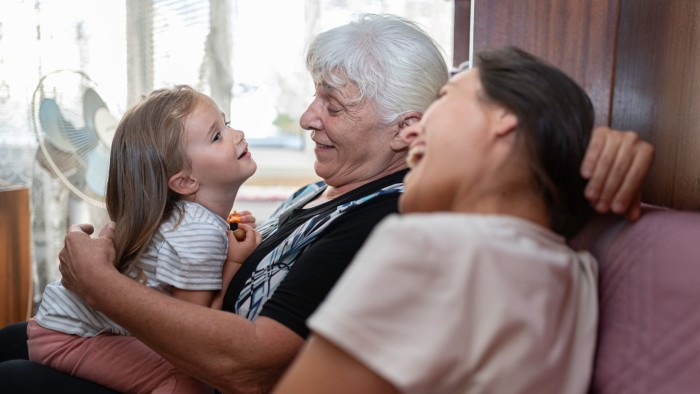Unlock the Editor’s Digest for free
Roula Khalaf, Editor of the FT, selects her favourite stories in this weekly newsletter.
“Sandwich carers” with responsibility for both children and ageing relatives suffer years of poor mental and physical health, scientists have found, highlighting the impact of increased life expectancy and later parenthood.
The research will add to a growing debate about governments’ responsibilities to people who provide long hours of unpaid care, often saving the state money at a cost to their own health and finances. Those sandwich carers who provided 20 or more hours a week of care to older family members faced the biggest deterioration in their wellbeing, the findings showed.
“It’s crucial that we recognise and support the unique needs of this growing group to ensure their health and resilience,” said Baowen Xue, leader of the research and an expert in epidemiology and healthcare at University College London.
“Providing targeted support and resources, such as access to respite care and workplace flexibility, is crucial to help maintain their health and wellbeing, particularly for those offering intensive care,” she added.
The study, published in the journal Public Health on Tuesday, used questionnaire data from a UK study that tracked about 40,000 households between 2009 and 2020. It compared a group of just over 2,000 sandwich carers, whose average age was 37, with a similar number of parents living with a child under 16 but not looking after older people.
Researchers examined levels of psychological distress, depression, anxiety, social activity and carelessness.
The mental health of sandwich carers, typically aged between 30 and 49, deteriorated more sharply than that of people who cared only for adults in previous UK research, the scientists said. That suggested the growing trend for adults to shoulder the burden of dual responsibilities took a toll.
The decline in mental health lasted for up to eight years, the study found. The research did not find a gender difference in the effects of becoming a sandwich carer, although two-thirds of participants were women.
The impact on sandwich carers was particularly acute for those who provided 20 or more hours of care per week, leading to deteriorations in both mental and physical health. “The emotional toll may contribute to feelings of distress and burden,” they wrote.
The study highlights the social consequences of ageing societies seen in an increasing number of countries, particularly rich nations. Global life expectancy at birth rose from 66.8 years in 2000 to 73.1 in 2019, before falling back during the Covid-19 pandemic.
Parenthood now starts later in some countries. Women born in 1990 were the first cohort in England and Wales in which half had no children by their 30th birthdays, according to official figures.
The study’s limitations included a lack of data on participants’ care history, their motivations to provide care and the conditions of the people they were caring for, the Public Health researchers said.
Bias may have arisen in the findings because sandwich carers excluded under its criteria were more likely to be older, have only one child, belong to an ethnic minority or come from the poorest households.
But the survey laid bare the “potentially devastating consequences” of responsibilities that meant many sandwich carers had to curtail work, said Beth Neale, research manager at Carers Trust, a UK charity.
“This is driving many into poverty. There is also a stark gender imbalance to sandwich care, with 61 per cent of it falling on the shoulders of women,” Neale said. “This requires an urgent response from government and a clear plan to aid carers facing burnout and deteriorating health.”
Read the full article here

